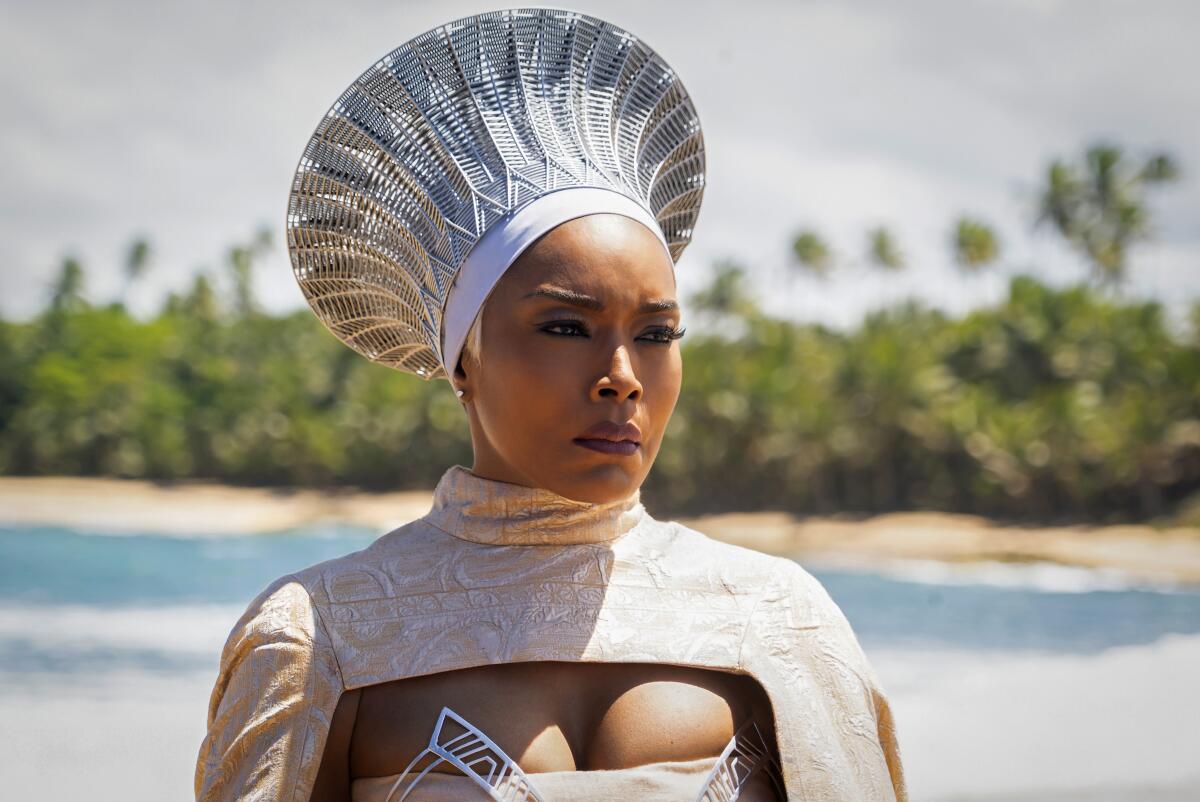Column: The heart that Angela Bassett brings to ‘Wakanda Forever’ transcends the genre

- Share via
For over 25 years I have designed costumes for Ms. Angela Bassett … totaling nearly 200 costumes and counting. I can think of two numbers that haven’t changed in over 25 years. My mom’s phone number and Angela Bassett’s measurements. — Ruth E. Carter
The crowd roared at that joke earlier this month at the Palm Springs Film Festival because of Carter’s impeccable delivery and the fact her joke came with a side of truth.
From showcasing Carter’s work in her breakout role as Tina Turner in the 1993 biopic “What’s Love Got to Do With It” to sprinting on the beach in “How Stella Got Her Groove Back” to the cadence of Queen Ramonda’s walk in the opening moments of last year’s “Black Panther: Wakanda Forever,” it seems Bassett has been untouched by time. Much like Marie Laveau, the centuries-old voodoo high priestess whom Bassett portrayed in “American Horror Story: Coven,” for which she garnered one of her seven Emmy nominations.
Opinion Columnist
LZ Granderson
LZ Granderson writes about culture, politics, sports and navigating life in America.
Perhaps one of the reasons Bassett is so timeless is there have not been many award seasons to have rolled by without mention of her name — at least not since Reva took Tre to go live with his father (“Boyz n the Hood,” 1991). But this season the breeze feels different. Bassett has already won the Golden Globe and Critics Choice awards for best supporting actress for her portrayal of Queen Ramonda. She’s nominated for a SAG award. Oscar nominations will be announced next week, a list on which she has not been included since 1994. But again, this season feels different.
In her speech, Carter remarked that Bassett brings out the best in others. Carter herself made history in 2019 by winning an Academy Award for best costume design for “Black Panther,” Marvel Studios’ first Oscar. This month she cited an example from 1992’s “Malcolm X,” a scene she witnessed in which Bassett appears opposite Denzel Washington.
“He looked over at her kind of stunned and he said, ‘That was good, real good,’” Carter recalled.
This time around, it appears it is the role that has brought out the best in Bassett. Her character in the Marvel sequel is mourning the loss of her son — a pain the audience can imagine and relate to, not the sort of portrayal many expect in a superhero movie. The fact that Chadwick Boseman is no longer with us only added to the challenge she and the rest of the cast and crew had to navigate.
In her memoir “Becoming,” Michelle Obama wrote: “It hurts to live after someone has died. It just does. It can hurt to walk down a hallway or open the fridge. It hurts to put on a pair of socks, to brush your teeth. Food tastes like nothing. Colors go flat. Music hurts, and so do memories …. Grief is so lonely this way.”
Bassett’s portrayal of Ramonda embodies that passage. It is written in her dialogue, but more importantly it is felt in her silence. Mourning is as universal as joy. We recognize it. We understand it. And this is why Bassett may bring Marvel Studios another Oscar first — this time for acting.
The truth is the story of loss has always been an essential element of the hero’s journey in comic book lore. Batman lost his parents. Spider-Man his parents and his uncle. Superman lost his planet. The reason these characters have endured isn’t based solely on their powers. It’s also because of their struggles, their humanity. We are conditioned as film consumers to recognize that in war films and action dramas like “Braveheart” and “Gladiator” in spite of the large explosions and CGI. But once you introduce superhuman powers into the plot, it’s easy to forget about that human aspect.
But Bassett never lets us forget.
She never stops reminding us that “it hurts to live” and that “grief is so lonely this way.” Remember: Ramonda lost her husband in a terrorist attack. Her son died. Her remaining child is kidnapped. All of this while she is queen of the most powerful nation in the world.
As a fan (and former red-carpet host for Marvel films) I know big-budget comic book movies are chided for being heavy on tights and explosions. Bassett’s performance has not been the only one worthy of industry praise, but it has been the hardest to ignore. That’s because Ramonda is not a superhero.
She is a grieving widow. A heartbroken mother. A world leader under attack. And she brings all of that crushing, emotional weight into each scene in powerful — but usually subtle — ways. The breath taken when someone says something that triggers you, the look given when trying to be strong for the comfort of others. There is a collective knowing she brilliantly taps into, and by the time she dresses down a loyal general for failing to protect the princess, you can feel just how exhausting being strong for everyone else has been.
Queen Ramonda may not have superpowers, but Bassett’s incredible talent has always been her ability to communicate the complexity of the human condition. From Reva to Stella to Ramonda, all of these characters have been forced to make difficult choices in the most taxing of circumstances. And Bassett has always been able to touch us, so we feel that duress.
I don’t know whether Bassett’s measurements haven’t changed in 25 years, as Carter claimed, but I do know her caliber hasn’t. Queen Ramonda required the best of Bassett, and as always, the icon was ready for the challenge.
More to Read
A cure for the common opinion
Get thought-provoking perspectives with our weekly newsletter.
You may occasionally receive promotional content from the Los Angeles Times.












